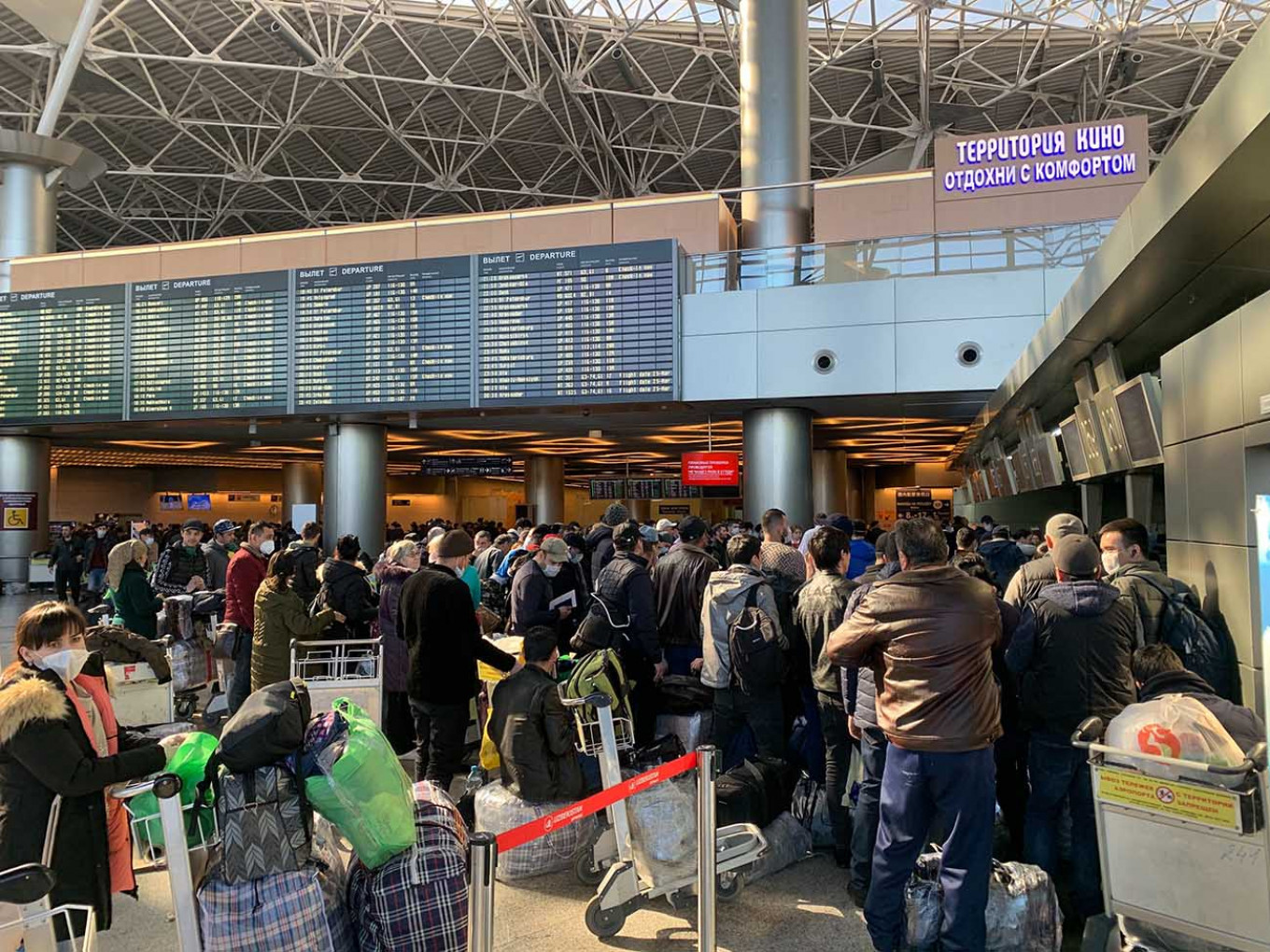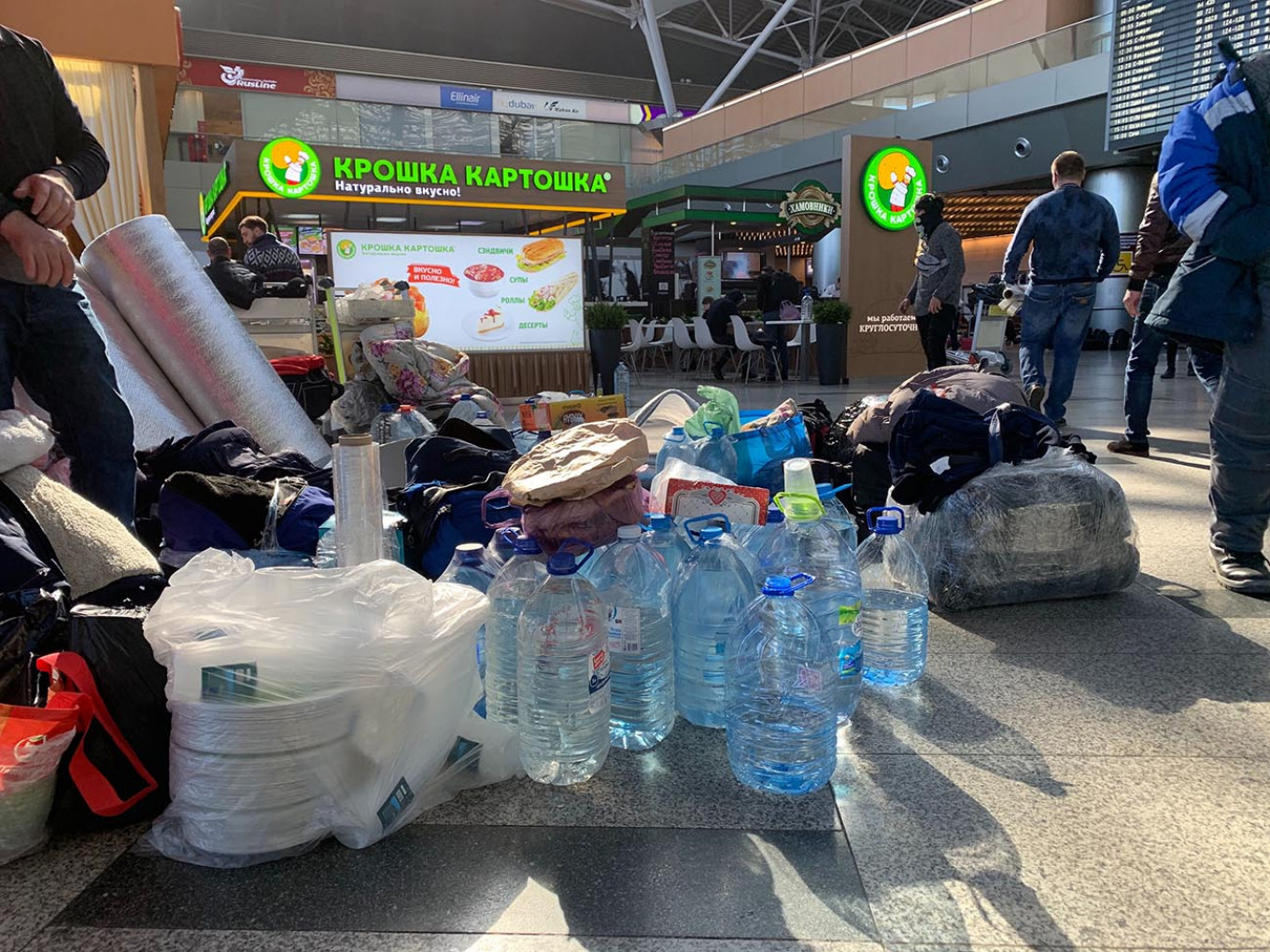The stale smell of unwashed bodies wafted through the glass doors of Moscow’s modern Vnukovo International Airport as soon as they slid open. Then came the noise.
Dozens of citizens of Uzbekistan, some of whom have been stranded at the airport for over a week, were shouting at two of their embassy’s representatives on Tuesday morning, desperate to board a charter flight scheduled to leave for the Uzbek capital Tashkent that afternoon.
With the help of two riot police officers, Moscow policemen held back the crowd trying to push through to the check-in gates.
“We’re hoping to get everyone on board,” Timurbek Shamsibayev, First Secretary of the Embassy of Uzbekistan in Russia, told The Moscow Times. “If not, we’ll pay for lodging and transport. The next flight will be in the coming days.”
As the coronavirus outbreak has grown to become a global pandemic, countries have rushed to close their borders and urge their citizens to return home while they can in an effort to stem the spread of the deadly virus. But with most flights canceled and prices rising dramatically, many people have been left stranded abroad.
For Moscow and its four international airports — the central hub of air travel for the greater region — that has meant a flood of migrant workers from Central Asian countries hoping to get home.

Each year, hundreds of thousands of migrant workers flock to Russia in search of better pay to send home to their families. According to numbers released by the Federal Security Service (FSB) last year, 2.4 million labor migrants came to Russia in the first half of 2019 alone. The top three countries sending workers were Uzbekistan, Tajikistan and Kyrgyzstan — all post-Soviet states.
On March 21, the independent Novaya Gazeta newspaper reported that around 400 Kyrgyz and Tajik citizens have been stranded in Moscow’s Zhukovsky International Airport since March 19. It added that another 371 citizens of Uzbekistan, Tajikistan and Azerbaijan — another former Soviet country — were in Vnukovo. They have been stuck there since March 17.
Stranded passengers told Novaya Gazeta they had purchased flights with Russia’s Ural Airlines that were canceled. They said they had neither been warned of the cancelations before arriving at the airport nor received refunds. Now they were being told they could buy new tickets at around three times the usual price.
But many can’t afford new flights without refunds and are now relying on their governments to lay charter flights to get them home. So far, these have been few and far between.
“We’re told we’ll be on a flight tomorrow,” Sharif Muratov, a 47-year-old seasonal construction worker from Tajikistan who has been in Vnukovo since March 17, told The Moscow Times. “But they’ve been telling us that for a while now.”
Vnukovo did not respond to a request for comment for this article. But one high-placed manager who asked for anonymity because they are not authorized to speak on the subject explained that the airport is in a difficult position.
“We don’t want this situation either and we offered to pay for flights,” the person said. “But the governments refused.”

Uzbek Embassy spokesperson Shakhriyor Turgunboyev told The Moscow Times he had not heard of any such offer from Vnukovo.
Valentina Chupik, who heads the migrant workers rights organization Tong Dzhakhoni, also said she knew nothing of the offer, but believed it was plausible that the governments could have turned it down due to difficulties finding places to quarantine their citizens upon their arrival home. She said that embassy officials had told her this was the reason for the dearth of charter flights.
For his part, Shamsibayev of the Uzbek Embassy said his government is scrambling to get citizens out of countries all over the world, so it can’t send daily flights just to Moscow.
While Shamsibayev was wearing a mask and latex gloves, the mass of his compatriots had no protection. There were also no measures being taken to maintain distance — a measure that epidemiologists have said is necessary to stop the transmission of the highly contagious coronavirus from person to person.
“We’re not worried about that,” said Muratov, when asked if he was concerned about the crowding. “God is protecting us.”
Stranded migrant workers are also being helped throughout the ordeal by diaspora volunteers and local business owners.
On Monday, Alexei Khodorkovsky, a Moscow restaurateur, delivered 200 meals to Vnukovo, despite an economic downturn and likely impending coronavirus shutdown already forcing him to close down one location — and probably all of them soon — until “better times.”
“Let’s show that the epidemic has not affected us in the worst sense, that it did not turn us into savages,” Khodorkovsky wrote on his Facebook page Monday in a call for other restaurant owners to pitch in.

Over the past week, Tong Dzhakhoni, which subsists on donations from Central Asian diasporas, also delivered meals, including to Moscow’s other two international airports Sheremetyevo and Domodedovo, where several dozen other people have been stuck for days too.
By Tuesday evening, there was finally some movement. Chupik told The Moscow Times that 376 Tajik citizens boarded charter flights from Zhukovsky, while 260 Uzbek citizens made it onto the charter flight from Vnukovo.
But about 180 Kyrgyz citizens are still stuck in Zhukovsky, while 42 Ubek and about 70 Tajik citizens remain in Vnukovo. Chupik said she hopes charter flights will come for them in the coming days.
“We can’t feed the rest,” Chupik said. “I’ve already spent my entire month’s salary on them.”
Turgunboyev, of the Uzbek Embassy, said the embassy is now offering accommodation and food for citizens trying to get home so that they don’t end up stuck in Moscow’s airports.
“The stream of people is currently without end,” he said.
As one Uzbek citizen at Vnukovo explained: “The most important thing for all of us during this crisis is to be near our families.”
Pjotr Sauer contributed reporting to this article.
